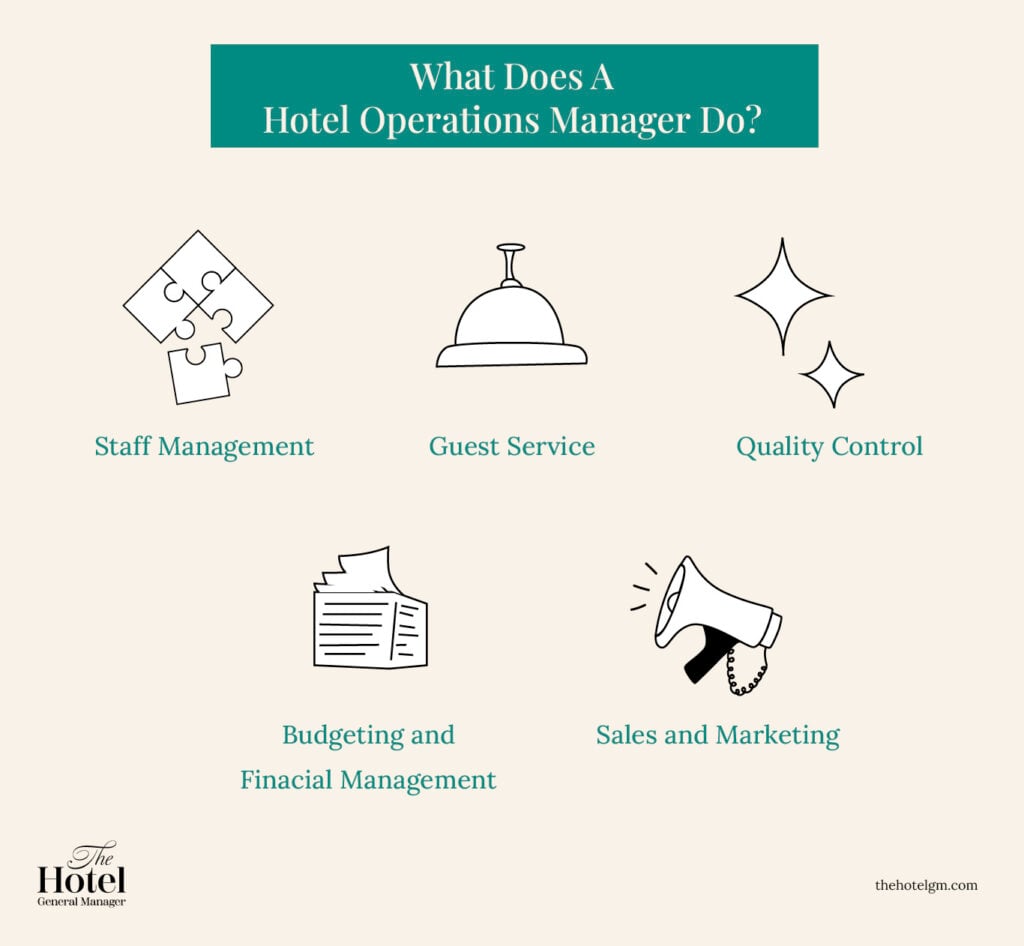We all know the joy of walking into a beautiful hotel, where guest service surpasses expectations, careful attention to detail is evident, and events unfold smoothly. Those familiar with the hospitality industry know the importance of providing excellent guest experiences.
Amid the various roles within the hotel staff, there's an often overlooked hero, the magician behind the curtain: the Hotel Operations Manager.
Every Hotel Operations Manager would love to get their hotel listed as one of the best, but in the non-stop world of hotels, it takes a lot of work to get there.
In this article, I’ll explore the responsibilities of a Hotel Operations Manager, highlighting the essential tasks they handle to maintain smooth hotel operations while delivering great guest services.

Job Description
Hotel Operations Managers have a vital role in coordinating services to ensure guests have an enjoyable stay. Their hotel position responsibilities cover a wide range, including managing day-to-day operations, improving staff productivity, maintaining high standards, and addressing unexpected issues.
Working closely with the Hotel General Manager and the Front Office Manager, the Hotel Operations Manager person is the backbone of the operation, ensuring everything runs seamlessly behind the scenes.
A hotel operations manager works extremely hard. Their job description is really in the job title itself. They oversee all the operations of the hotel- from managing guest experiences to upholding top-notch service standards. Their role covers staff coordination, financial oversight, quality control, and teaming up with the marketing and sales crew.
With an eye for detail, strong leadership skills, strong communication skills, and problem solving skills and a real grasp of the hospitality world and revenue management, the Hotel Operations Manager works with their team in crafting a warm and unforgettable guest atmosphere, playing a big part in the hotel's overall success.
Responsibilities
Let's take a look at some of the key responsibilities that a hotel operations manager does. Keep in mind that these may look different depending on the property management system in place.
Staff Management
Hotel Operations Managers really are the driving force behind staff management. Their ultimate goal is to create a smooth running team that delivers incredible guest service!
Here are some of the common staff management responsibilities:
Hiring and Recruitment:
- Operations managers are often involved in the recruitment process, by reviewing applications, and conducting interviews. Typically are the final decision in selecting the candidates.
Training:
- Hotel Operations Managers will be involved in developing training programs for new hires, ensuring that new employees are well versed in hotel policies, procedures, and customer service standards for the hotel.
Scheduling:
- Working with the department managers or supervisors, the Hotel Operations manager will make sure that adequate staffing and coverage is needed for each department. Taking into consideration events at the hotel and the occupancy levels for that week.
Team Building:
- The hotel operations manager is key in fostering a positive work environment within the hotel and the different hotel departments. They will work with department heads in coming up with strategies to motivate and encourage hotel employees.
- This can come through recognition programs for the staff and also incentive programs in the hotel. This not only boosts the employee morale and creates job satisfaction, but it also helps create a positive hotel environment for the guests!
Performance Evaluation:
- After working many years in Human Resources in Hotels, I can’t stress enough how important this one is! Regular evaluation reviews are highly important for hotel operations managers.
- This does not need to be a daunting task. Performance reviews are such a great opportunity for your hotel culture! These reviews help in assessing the hotel staff performance, an opportunity to offer useful feedback, and supporting ongoing guest service improvement in the hotel.
- By consistently reviewing employee and manager performance, hotel operations managers can spot strengths and areas for growth, making it easier to plan effective training!
Reviews encourage open communication between supervisors and hotel employees , fostering an environment where concerns, accomplishments, and career goals can be freely discussed.
Conducting these reviews not only boosts individual staff performance but also enhances guest experiences, staff morale, and the hotel's reputation in the competitive hospitality industry.
Guest Services
The Hotel Operations Manager really is at the heart of the guest experience. If any guest issues arise, the Hotel Operations Manager is quick to respond, prioritizing guest satisfaction.
Hotel operations managers collaborate often with different departments to provide smooth services for customer satisfaction, top-notch amenities, and personal touches that leave a positive, and hopefully memorable guest experience!
Here are some key areas of the Guest Service Experience that the hotel Operations manager oversees:
Check-in and Check-out:
- Working with the Front Desk Manager and front desk team, the Hotel Operations manager will oversee the check in and check out processes making sure that it's efficient and accurate, and above all, a welcoming experience for all hotel guests.
- Ensure accurate billing and payment processes, resolving billing discrepancies, and addressing any payment-related inquiries.
Guest Requests and Concerns:
- Hotel operations managers handle guest requests and concerns promptly, aiming for positive and memorable stays for hotel guests!
- Analyze guest feedback for improvements and recognizing exceptional service.
- Work with hotel staff to fulfill special requests like room upgrades, creating enhanced experiences, particularly for special occasions.
Concierge Services:
- Overseeing the provision of concierge systems and services, offering information, recommendations, and assistance to guests for activities, dining, transportation, and local attractions.
Reservations:
- Keeping an eye on hotel reservations, handling room availability, and working together with the reservations team to make sure room occupancy is being maximized.
- Managing room assignments and ensuring that guest preferences and special requests are accommodated to the best extent possible.
Quality Control
A really great Hotel Operations Manager really does have a sixth sense for quality control—they can spot a pillow out of place from far off and sense a wobbly table even with closed eyes.
I've seen a similar sharp eye in my husband during our travels; it sometimes made it tough to just relax and enjoy a hotel stay as he effortlessly spotted glitches from a distance. But, as annoying as it was sometimes, his role as a Hotel Assistant Manager/Operations manager for luxury hotels refined this remarkable attention to detail, which became a natural part of his perspective.
Facility Maintenance:
- Hotel Operations Managers are the driving force behind quality control. They meticulously attend to every detail that contributes to a remarkable guest experience, from pristine rooms to amenities and facility maintenance.
- These managers work in close collaboration with various departments, ensuring services align with the hotel's standards and guest expectations.
Regular inspection:
- Regular inspections and swift response to feedback are their priorities, ensuring any concerns are promptly addressed. Their dedication ensures the hotel consistently offers guests a top-notch experience, leaving them content, at ease, and eager to return.
Cleanliness KPIs:
- A major way Hotel operations managers track quality control is relying on Key Performance Indicators (KPIs) as crucial measures to assess their hotel's performance. These metrics allow them to monitor progress over time and implement necessary adjustments to enhance the hotel's overall performance.
Budgeting And Financial Management
Keeping a steady hand on the budget while managing the financial aspects of the hospitality business is often a role the Hotel Operations Manager takes.
Hotel Budgeting:
- Working closely with the finance teams, they create budgets that match the hotel's goals and expected earnings, and they will keep a close eye on this spending. As “stewards of the finances,” they will track expenses, monitor room rates, and track revenue, profits and losses while finding ways to save without compromising guest satisfaction.
Asset Management & Performance:
- A lot of this can be made simple by using the right software. Hotel asset management software is designed to help hotel owners, managers, and operators improve how their assets perform and make more money. Hotels will often use this software to make the hotel operations smoother, make more money, and make guests happier.
- The software helps in a lot of ways, like planning repairs, managing energy, keeping track of schedules, saving money, managing work, and analyzing finances. It all happens in one place, which makes it easier to make smart choices and do well in the tough hotel business.
Sales & Marketing
Hotel Operations Managers act as the connection between operations and Sales & Marketing. They often work closely with sales and marketing team members to ensure a seamless and appealing guest experience. By sharing “boots on the ground” insights about guest preferences and trends, Operations Managers help fine-tune marketing strategies that truly connect with potential guests.
Hotel Promotions:
- They make sure that the promises made in the hotel promotions match the real guest experience, building trust and loyalty. Their input is also key in crafting tempting room packages and offers that not only attract customers but also enhance their stay.
- Through this partnership, Hotel Operations Managers guarantee that the hotel's services are not just well-executed, but also smartly marketed, leading to higher bookings and overall hotel success!
Job Requirements
Typically a college bachelor degree is a prerequisite for this role. Many universities & colleges offer bachelor's degree programs that focus on hospitality management or hotel administration.
The coursework typically covers a range of subjects including human resources, accounting, finance, hospitality planning, strategic management, Food & Beverage, legal matters in the hospitality industry, and restaurant management.
Many hotels actually go beyond educational qualifications and really require specific years of experience. Many hotels actually prefer promoting existing employees to management positions due to their acquired experience and familiarity with internal policies.
Beginning with an entry level hotel job can provide valuable insights into whether this career path in the hotel industry suits you, and it's an excellent way to accumulate essential experience.
Salary
The typical salary of Hotel Operations Managers can vary widely depending on factors such as the size and type of the hotel, its location, the manager's level of experience, and the local job market conditions. On average, in the United States, Hotel Operations Managers earn between $50,000 to $100,000 per year.
However, this range can extend higher for managers in luxury or larger establishments, particularly those located in major cities or popular tourist destinations.
Still Interested?
As you can tell, being a hotel operations manager isn't a job for the faint-hearted or those who prefer the easy way. They truly form the backbone and heartbeat of the hotel.
So, if you're eyeing a career as a Hotel Operations Manager, know that it's more than just comprehending roles and responsibilities. It's about embracing the soul and vibe of the hotel you're part of. It's not just about ticking boxes; it's about igniting team members' passion, cultivating a positive atmosphere across the hotel, and thereby inspiring teams to craft remarkable and hopefully unforgettable experiences for your guests.



